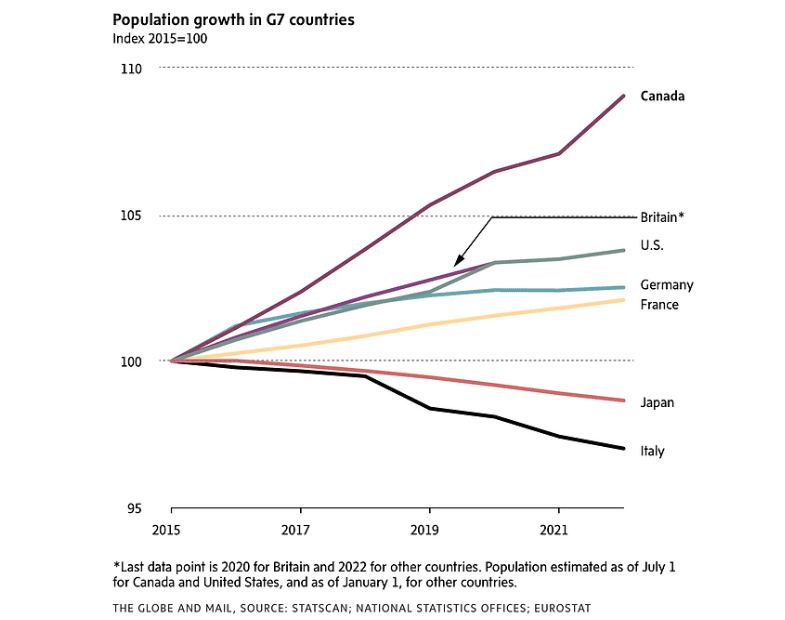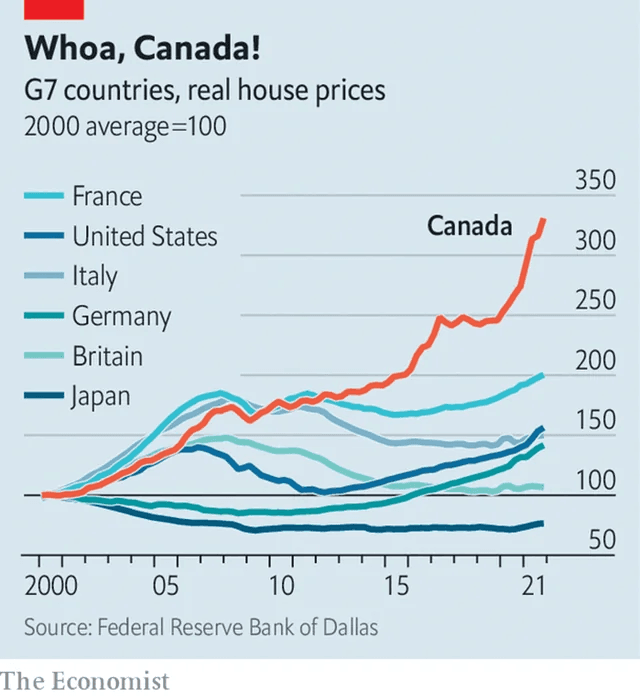Criticizing Immigration Laws is Not Racist
“I’m not racist, but”, “I don’t want to sound racist, but”, is what I’ve been hearing from some of my Canadian friends in recent conversations.
Growing up in Canada, our immigration policy was a source of pride. We had a robust system that made sure we took in highly educated immigrants from all over the world. I remember in high school, my math teacher had immigrated from Algeria, and had a PhD in computer science. Canada even welcomed a modest amount of refugees from oppressed countries, and I would hear stories from Uber drivers tell me how grateful they were to be in Canada.
Now, however, recent headlines show that the majority of Canadians think there is too much immigration? How did this shift happen?

First, as the title of this blog post claims, I’d like to emphasize the fact that you can critique government policies, and even immigration policies, without being racist. It is not de-facto racist to do so. Second, I’d like to point out that it is actually a great concern that people are afraid to speak up. As we saw in the USA recently, the backlash against this sort of “cancel culture” leads to populism in a mix of projection, reactance and self-fulfilling prophecy. Finally, I’ll advocate that the least we can do is talk about it. While “freedom of speech” has been a right wing talking point of late, it really shouldn’t be. One of the greatest things about the West, and in this case Canada, is the fact that we have the freedom to discuss important topics, this being one of them.
Is it Racist?
Now, when I claim that it isn’t racist to criticize immigration policy, am I saying that this is 100% always the case? No. Of course not. But that should go without saying! In the Canada I grew up in, people had respect for each other and tried to argue in good faith.
What I’m saying is that it’s wrong to assume the worst in people who disagree with you. I think that the political environment these days tends to put kindle to the fire, so to speak, on these kinds of issues. I think everyone needs to take a breath, a step back, and realize that the vast majority of people want to discuss this sort of thing because it’s important to them. It’s important as a country to be able to discuss this sort of thing.
It’s also important to acknowledge that it can be a difficult topic, but that’s ok! We shouldn’t shy away from difficult topics. Differing viewpoints can also be true. For example:
Is immigration affecting housing costs? Yes, most likely.
Is immigration the sole reason for housing costs shooting up? No, it would be naive and simple minded to think so.
Is immigration often used as a scapegoat for issues like these? Absolutely.
And so immigration policy is a complex issue, far more complex than I can even attempt to discuss in this simple blog post. All the more reason why we should not be afraid to talk about it.

People should not be afraid to speak up.
There are many historical, as well as contemporary, examples of societies where citizens are afraid to speak up about certain things. There are extreme examples like in North Korea, where citizens need to pretend that everything is great and the supreme leader is adored. But even in freer societies, a quieter version of this fear can take hold. Take McCarthyism in the United States for example - modern day witch hunts, resulting in lost jobs, reputations, and careers for simply being associated with certain ideas or acquaintances.
So, when I notice that my friends start speaking in hushed tones, and looking behind their shoulders when the topic of immigration comes up, I become concerned.
It’s not that people shouldn’t be careful or respectful when discussing sensitive issues - indeed they should! That should be a given, for civilized society.
But when ordinary citizens feel afraid to even ask questions or share their honest experiences, something important is lost. Fear shuts down dialogue, and without dialogue, we can’t solve complex problems.
A healthy society should be able to talk about immigration, its benefits, its challenges, its effects on communities, openly and intelligently, without labeling people as hateful for simply raising concerns.
And this is a very important point: When discussions are policed by fear or social punishment, opinions don’t disappear. Instead, they tend to go underground, and the landscape becomes more polarized.
Case Study: Populism in the USA
Recently, the United States saw growing distrust toward institutions during and after the COVID-19 pandemic about vaccines, mandates, and government transparency. In Canada, it’s easy to look down on Americans and view these ideas as “anti-science” and those who hold these views as uneducated. However, it’s important to recognize that this sentiment didn’t arise in a vacuum. It was, in many ways, a reaction to years of people feeling unheard, dismissed, or publicly shamed for questioning official narratives.
Among many Black and low-income communities, for instance, vaccine hesitancy was partly rooted in a long history of medical neglect and exploitation, from the Tuskegee syphilis study to ongoing disparities in healthcare access. These groups weren’t rejecting science itself, but expressing a deep, historically justified mistrust of the institutions delivering it.
When people feel unheard or silenced, they often turn to leaders who promise to “say what others won’t”, even if those leaders do so crudely. Populism thrives in environments where open discussion has been replaced by social punishment. It’s a backlash not just against elites, but against the sense that truth itself has become politically off-limits.
Canada is not immune to the same forces. When citizens feel that certain opinions or experiences are off-limits, or that asking questions might cost them their reputation, the result isn’t greater social harmony, but quiet resentment. And over time, that resentment can erupt in the form of populism, protest movements, or deep political polarization.
I’ll end with this: In an age where politicians are raising alarms about threats to democracy, social media is causing increased polarization, and hate crimes are on the rise, I urge Canadians to allow themselves to express their opinions. I also urge them to speak to each other openly and most importantly to listen to the opinions of those who they disagree with, even when those conversations are uncomfortable. It’s the least we can do.
P.S. I'm planning on moving to Substack, so subscribe for future posts!